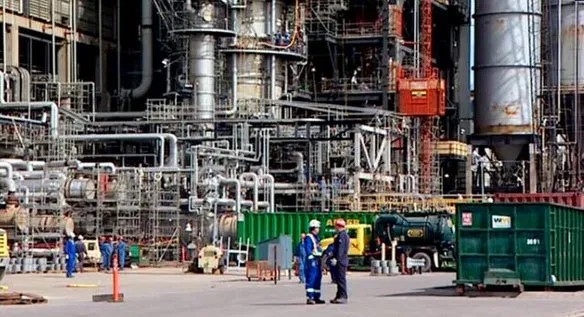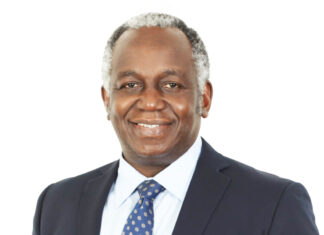By Jeph Ajobaju, Chief Copy Editor
A 20 per cent government stake in Dangote Refinery for $2.76 billion has been approved by the Federal Executive Council (FEC), to be managed by the Nigerian National Petroleum Corporation (NNPC), against the wishes of Aliko Dangote.
The money comes it handy, but Dangote and financial and oil experts see the acquisition as a Trojan horse that will introduce corruption into a $15 billion private enterprise that aims to end Nigeria’s dependence on refined fuel imports.
NNPC Group Managing Director, Melee Kyari, disclosed in June that Dangote does not want the NNPC as a partner, yet insisted on energy security by “having a say in the board of the refinery” through the acquisition of stakes.
The NNPC first announced in May plans to purchase a stake in Africa’s biggest refinery to ensure uninterrupted supply of petroleum products countrywide when the plant begins production in 2022.
The News Agency of Nigeria (NAN) reports that the approval was disclosed by Minister of State for Petroleum Resources, Timipre Sylva, after the virtual FEC meeting in the Villa chaired by Vice President Yemi Osinbajo.
Sylva said the FEC also approved contracts for the rehabilitation of Warri and Kaduna refineries.
Said he: “The FEC, today, approved the award of contract for the rehabilitation of Warri and Kaduna Refineries at the combined total sum of $1.5 billion – $897.67 million for Warri Refinery and $586.9 million for Kaduna Refinery.
“The Executive Council also approved the acquisition of 20 per cent minority stakes by the NNPC in the Dangote Petroleum and Petro-Chemical Refineries in the sum of $2.76 billion.”
Dangote Refinery, an integrated refinery and petrochemical project under construction in Lagos, is expected to produce 650,000 barrels per day (bpd), and will be Africa’s biggest oil refinery and the world’s biggest single-train facility.
Dangote wary of NNPC meddling in his $15b refinery
Kyari said the acquisition was driven by the profit potential of the refinery and the need to have a say in a business of this magnitude, which concerns energy security for Nigeria and Africa, with huge implications for the financial security of the country.
But Dangote’s wariness is supported by experts who argue that rather than the NNPC spending $4 billion to acquire stakes in a private business aiming at efficient delivery, it can inject that sum into reviving the four national refineries.
International Energy Services Limited (IESL) Chairman, Diran Fawibe, told The Guardian (Nigeria) that the quest of the NNPC does not make sense.
Energy security does not translate into acquiring a stake in a private refinery, he said, which could subject the private entity to political risk.
“When unscrupulous politicians get to power, the NNPC will lose control. It is not the NNPC that will dictate what will be done. I don’t think we should allow politicians to get into private refineries. They will mess them up,” Fawibe warned.
Fixing national refineries
Nigeria has four refineries: one each in Kaduna and Warri, two in Port Harcourt.
Sylva just announced FEC approval of contract for the rehabilitation of Warri and Kaduna Refineries at the combined total sum of $1.5 billion – $897. 67 million for Warri Refinery and $586. 9 million for Kaduna Refinery.
However, The PUNCH reports that a total N81.41 billion was spent on the four refineries between January and August last year even though they never refined a drop of crude oil.
Billions of dollars had previously been spent to rehabilitate them without success.
Tax payers bear the brunt of Abuja’s inability to make the refineries functional. Petrol currently sells for between N163 and N 165 per litre, with the NNPC mulling an increment, saying the pump price is short of landing cost of N232 per litre.
“We are also working on our refineries to make sure we fix them; we have awarded the Port Harcourt refinery rehabilitation and ultimately we are close to that of Warri and Kaduna, so that very soon, in July, all of them will work contemporaneously and at the end of the day, we will deliver all of them,” Kyari said, reported by PUNCH.
“The net effect is that you are going to have an environment where Nigeria becomes a hub for petroleum supply.”
“It is going to change the dynamics of petroleum supply, even globally, in the sense that the flow is coming from Europe today and it is going to be reversed to some other direction.
“We will be the supplier for West Africa legitimately and also many other parts of the world.
“The meaning of this is that there is an opportunity thrown at us and I am not sure that Mr Dangote wants to sell his equity in the refinery.
“I can confirm that it was at our instant that we started the engagement; he did not want to sell his shares in this refinery.
“There is no country that would watch a business of this scale, which is bordering on energy security, which also has high implication even on the physical security of our country, and you watch it that you don’t have a say.
“For us as a strategy, we will take equity in very significant businesses that are anchored on the oil and gas operations – fertilizer, methanol plants, modular refineries and so many other businesses that we are dealing with so that we can expand our portfolio but also as the national oil company.
“We have the responsibility to guarantee energy security for our country and there is nowhere you can have that say except you have a say in the board of this institution.”
“I am not sure Mr Dangote is very happy with this. We are taking 20 per cent equity of the Dangote Refinery. There is a valuation process, it is very international and very regulated. No bank will give you money to buy stake.”
Kyari disclosed that the NNPC was seeking approval of the FEC to close the deal with Dangote Refinery, which he said is worth about “$19 billion.”
He explained that “we are not going to take government money to buy it, we are going to borrow because we know that this business is viable in the short term. Banks have come forward to lend us.
“We are very proud that we did this, this is good for our shareholders, including all the 200 million Nigerians who will also be happily buying shares from this refinery if they have an opportunity.
“But now we have done that on their behalf so that ultimately, the value will come to all of us.”
When $4b government stake is a hindrance
The Guardian (Nigeria) quoted Kyari as disclosing a plan to award contracts for the rehabilitation of Kaduna and Warri Refineries latest by the end of July, which might also be followed by another five condensate refineries.
“We have about five initiatives that are going on. We are going to take final investment decisions (FIDs) on two of them between now and three months,” Kyari explained.
“The combined capacity is about 200 million per day condensate refineries. Dangote refinery will come to work by 2022, delivering 50 million litres of gasoline into the market.”
Kyari said Dangote Refinery was valued at about $19 billion and insisted that the NNPC needed to have a stake in it to guarantee energy security.
“We have a valuation of the refinery, about $19 billion, I don’t have the exact figure but I think about $19 billion. There is an ongoing engagement. There is a governance issue around this that we need to conclude.
“That governance issues include seeking the authority of the Federal Executive Council to close the deal.”
Experts back Dangote’s objection
But Chartered Institute of Bankers of Nigeria (CIBN) Chairman now professor of economics at Bowen University, Segun Ajibola, doubted projected gains from the acquisition of stakes in the Dangote Refinery by the NNPC.
“There may be a need for government to have a hold of such a sector provided that government has no business in the day to day management of the refinery.
“Government can just be a shareholder waiting for whatever comes back in terms of return on investment,” Ajibola told The Guardian.
“Government should not have any hand in the management because the history of government-managed entity is sad, from refineries to petrochemical, iron and steel and others.
“Another is, why can’t the government invest in building its own refineries with such money?”
He equally raised concerns on a competitive environment, noting that the market could be monopolistic as the government be competing with itself.
Adeola Adenikinju, a professor and energy economist at the University of Ibadan, said if based primarily on commercial proposition, the move by the NNPC should be a good decision.
“It is consistent with the expectation of the PIB for the NNPC to be a purely commercial enterprise that will make an investment based on purely commercial purposes.
“If the valuation was done right, then I have no problem with the decision of the NNPC,” he explained.
Centre for Transparency Advocacy (CTA) Executive Director, Faith Nwadishi, condemned the plan, saying the NNPC that has no investment capacity to sustain the sector and should focus on other aspects instead of moving into private business.
Her words: “I don’t think it is a wise investment for Nigeria. For me, the implication for the country is that we always have misplaced priorities, especially on issues relating to infrastructure.
“If we put $4 billion in Dangote Refinery and we have four refineries that are not working, what is the return on investment?”













